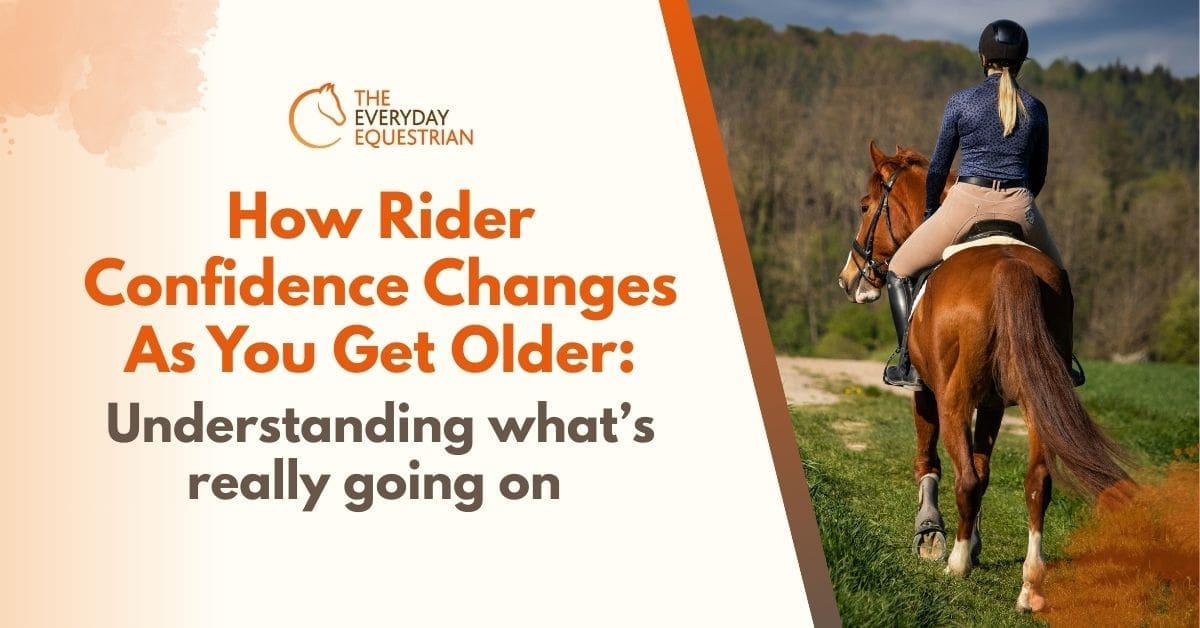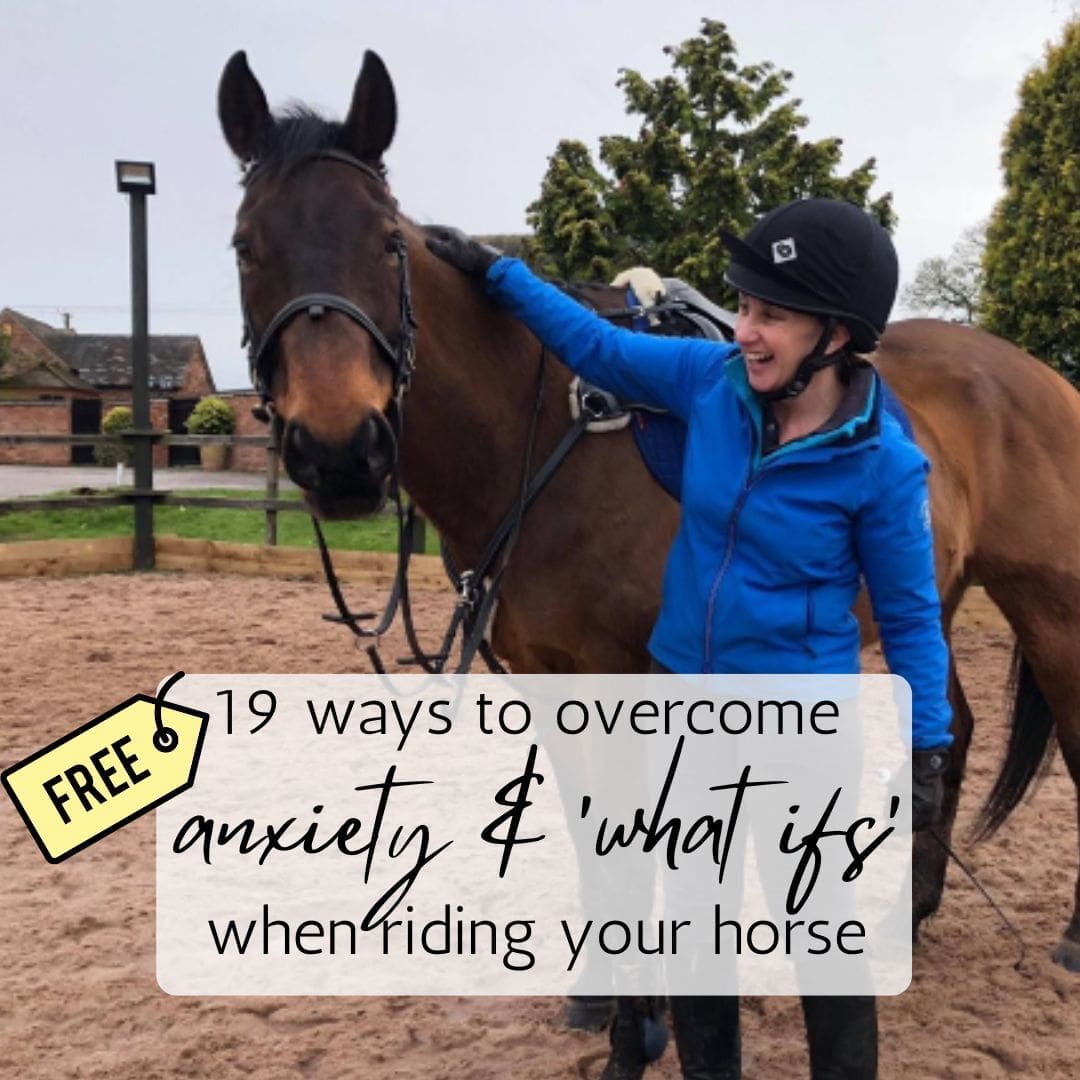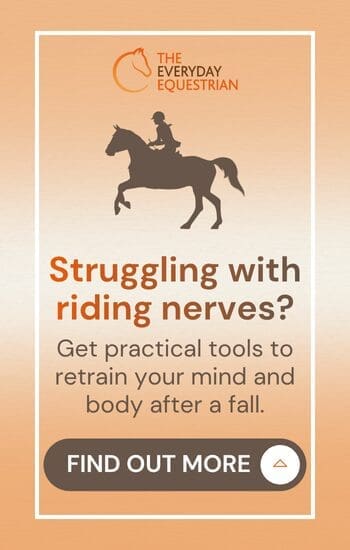Is It Just Age – or Something Else?
You might not say it out loud, but maybe you’ve felt it. That quiet voice wondering: “Is this just what happens as I get older?” One day you’re riding without a second thought, and the next, you notice a flicker of hesitation. The mounting block feels a bit taller. The ‘what ifs’ get a little louder.
If that sounds familiar, you’re absolutely not alone. Many riders find their confidence doesn’t stay the same as the years roll on – but not for the reasons we’re often told.
There’s a sneaky cultural story that says confidence must decline with age. That as we become more aware, more responsible, or more physically cautious, we lose some essential spark. And once that story takes hold, it can shape how we feel in the saddle before we’ve even picked up the reins.
But here’s the truth: confidence doesn’t just evaporate with each birthday. It changes. It softens. It asks for something different.
In this blog, we’ll gently unpack where the belief really comes from, why it has such a strong pull on so many riders, and how you can begin to shift that narrative. Because your riding years aren’t behind you – they’re evolving. And with the right support, you can ride into this next season with calm, clarity and trust in yourself.
What if age isn’t the thing getting in your way… but the belief about what age means?
Where This Belief Really Comes From
The idea that confidence naturally fades with age isn’t something you’re born knowing. It’s something you absorb – slowly, subtly – from the world around you.
Maybe someone made a passing comment about how “you don’t bounce like you used to.”
Maybe you’ve noticed friends quietly stepping back from riding altogether.
Or perhaps you’ve found yourself becoming more cautious, more aware of the risks, and wondering if that means your confidence is slipping.
Over time, these messages can settle in like background noise. They become part of the story you tell yourself – that age and confidence don’t mix.
But let’s pause for a moment.
What if what’s really changing isn’t your confidence, but your perspective?
As you get older, you’ve had more life experience – including the knocks, the near-misses, and the responsibilities outside of the yard. That doesn’t make you weaker or less brave. It means you’ve got more information to work with. And your brain takes that into account when you ride.
It’s not about “losing” confidence. It’s about confidence becoming more thoughtful.
More considered. Less about proving something – and more about choosing what matters most.
What have you started to believe about getting older and losing confidence? And is it really your belief – or one you’ve inherited?
The Emotional Weight of This Belief
Once you start to believe that getting older means losing confidence, it doesn’t just stay in your head. It settles in your body. It shapes how you ride.
You might notice yourself second-guessing decisions that used to feel automatic. Holding back from activities you used to enjoy, or feeling a twinge of shame or frustration when something that used to feel easy suddenly feels loaded.
That’s the weight of the belief.
It’s not just about what you can or can’t physically do – it’s about what you think those changes mean. And often, it sounds like this:
- “Maybe I’m not cut out for this anymore.”
- “I’m holding my horse back.”
- “Everyone else seems more capable than me.”
It’s a heavy thing to carry. And it’s not always visible from the outside.
Confidence wobbles in later life can bring a quiet grief – for the rider you once were, or the goals you thought you’d reach by now. There might be guilt, too, for not feeling as grateful or capable as you ‘should’ be. And that’s a hard place to ride from.
But here’s something to hold onto: these emotions are valid. They’re not signs of failure. They’re signs that you care. That you’re noticing the shifts and trying to make sense of them.
And that’s where change begins.
What do you tell yourself when your confidence dips – and how would it feel to meet that with kindness, instead of criticism?
When Your Body Shifts: Riding Through Menopause
For many women, confidence changes aren’t just about age – they’re about hormones.
Menopause and perimenopause can quietly rewrite the rules of how you feel in your body, your mind, and your riding.
One day, you might feel steady and capable. Next, you’re unusually anxious in the saddle for no obvious reason. Your reactions feel quicker. Your balance feels off. You find yourself second-guessing things that once felt routine.
This isn’t imagined. It’s physiological.
Fluctuating hormones can affect mood, memory, focus, joint mobility, sleep, and energy levels. And when your body and mind are shifting like that behind the scenes, riding can feel less predictable, even when everything else stays the same.
You might not hear this talked about much at the yard, but you’re not the only one navigating it. Many riders quietly wrestle with this stage of life, wondering if they’re suddenly ‘losing their nerve’ – when in fact, their nervous system is under strain from hormonal upheaval.
The emotional side can be just as challenging. There can be a sense of grief, or even betrayal: “I used to know who I was in the saddle. Where’s she gone?”
But here’s the truth: she hasn’t gone. She’s adapting. You’re learning to work with a new version of your body and mind – one that might need a different kind of support, pace, or preparation.
You don’t need to push through or pretend it’s not happening. You can honour it, adjust for it, and ride with it.
What would shift if you gave yourself permission to work with your body, instead of resenting its changes?
Psychology Behind the Belief: Your Brain Is Trying to Protect You
It’s easy to assume that if your confidence has dipped, something must be wrong. But often, it’s not a failure of bravery or skill. It’s your brain doing its job.
Your brain’s number one priority is to keep you safe. Not comfortable. Not confident. Just safe.
And as you get older – with more life experience, memories, responsibilities – your brain has more ‘data’ to scan through. It learns from the past and gets quicker at spotting potential risk, even when things are technically fine.
This is why you might suddenly hesitate before cantering on a horse you trust, or feel uneasy in a setting you’ve ridden in for years. Your brain isn’t trying to sabotage you. It’s running safety checks. And it doesn’t always get it right.
Think of it like an overcautious passenger in your car. Every time you edge close to a roundabout, they clutch the door handle. They mean well – they just don’t trust the brakes like you do.
It’s the same with your nervous system. When it perceives uncertainty, it reacts. Even when you know you’re okay.
Understanding this can take the sting out of those anxious moments. It’s not weakness. It’s not you being silly. It’s a healthy brain trying to keep you in one piece – just maybe a little too enthusiastically.
What changes when you see your hesitation as protection, not a problem?
Reframing the Narrative: Confidence Can Evolve
Confidence doesn’t always look like galloping across open fields or jumping without a second thought. Sometimes it looks like making a deliberate choice. Saying, “Not today.” Or, “Let’s stay in walk until we both feel settled.”
The old idea that confidence means fearlessness is narrow – and frankly, unhelpful.
As you get older, your confidence doesn’t vanish. It changes shape. It becomes quieter, more considered. Less about pushing through, more about tuning in.
This shift can feel strange if you’re used to measuring progress by boldness. But real confidence isn’t about how much you do – it’s about how you feel doing it.
You might be choosing a different pace these days – and that doesn’t mean you’ve gone backwards. You’re riding with a different kind of wisdom. The kind that listens to both your body and your horse. The kind that makes room for nuance, not just nerves.
It’s like moving down a gear in the car, not because you can’t drive fast, but because the road ahead calls for care. That’s not retreat. That’s skill.
What kind of confidence would feel most meaningful for you right now – not five years ago, not in your twenties, but today?
How to Rebuild Confidence on Your Terms
Rebuilding confidence doesn’t have to mean starting from scratch or pushing through fear. It’s about meeting yourself where you are, and making small, intentional adjustments that feel doable – not dramatic.
This might look like:
- Riding a horse you trust in a setting that feels familiar
- Asking someone to walk alongside you for moral support
- Practising mounting and dismounting until it feels smooth again
- Pausing when your body says “enough” – and listening to that
These steps might feel small, but they’re powerful because you’re choosing them. You’re not being pushed. You’re leading the pace.
Confidence grows when you create experiences that feel safe, supportive, and repeatable. That might mean changing your environment, your goals, or your support system. It might mean working with a coach who understands how mindset, body awareness, and lived experience all intersect in the saddle.
And remember, it’s okay if your confidence doesn’t look like anyone else’s.
You get to define what “enough” looks like now.
What’s one small shift you could make that would help you feel more in charge of your riding again?
You’re Not Losing Confidence – You’re Riding Differently
What if this isn’t about losing anything?
What if the boldness you once rode with hasn’t disappeared – it’s just become more thoughtful, more intentional, more in tune with who you are now?
You’re not going backwards. You’re riding with new information, in a different phase of life, with priorities that might have shifted. That’s not decline – that’s maturity and growth. It takes strength and awarenss to adapt, to soften where needed, and to choose your path with clarity.
Confidence isn’t about riding the same way you used to. It’s about trusting yourself in the way you need now.
What if this season of riding is about depth, not daring?
Your Confidence Is Still Here – It’s Just Wearing Different Boots
Getting older doesn’t mean your riding days are numbered. It means your relationship with confidence is shifting – and that’s something you can work with, not against.
You’re not broken. You’re not behind. You’re a rider with experience, insight, and the right to define what confidence looks like for you now.
And you don’t have to figure it all out on your own.
If you’d like steady support, psychology-based tools, and a community that truly gets it, come and join us inside the Crack the Confidence Code Membership. It’s a space built for real riders navigating real-life confidence dips – with no pressure, no perfectionism, and no pretending.
You don’t need fixing. You just need the right kind of help to reconnect with the rider you already are.
Ready when you are.



